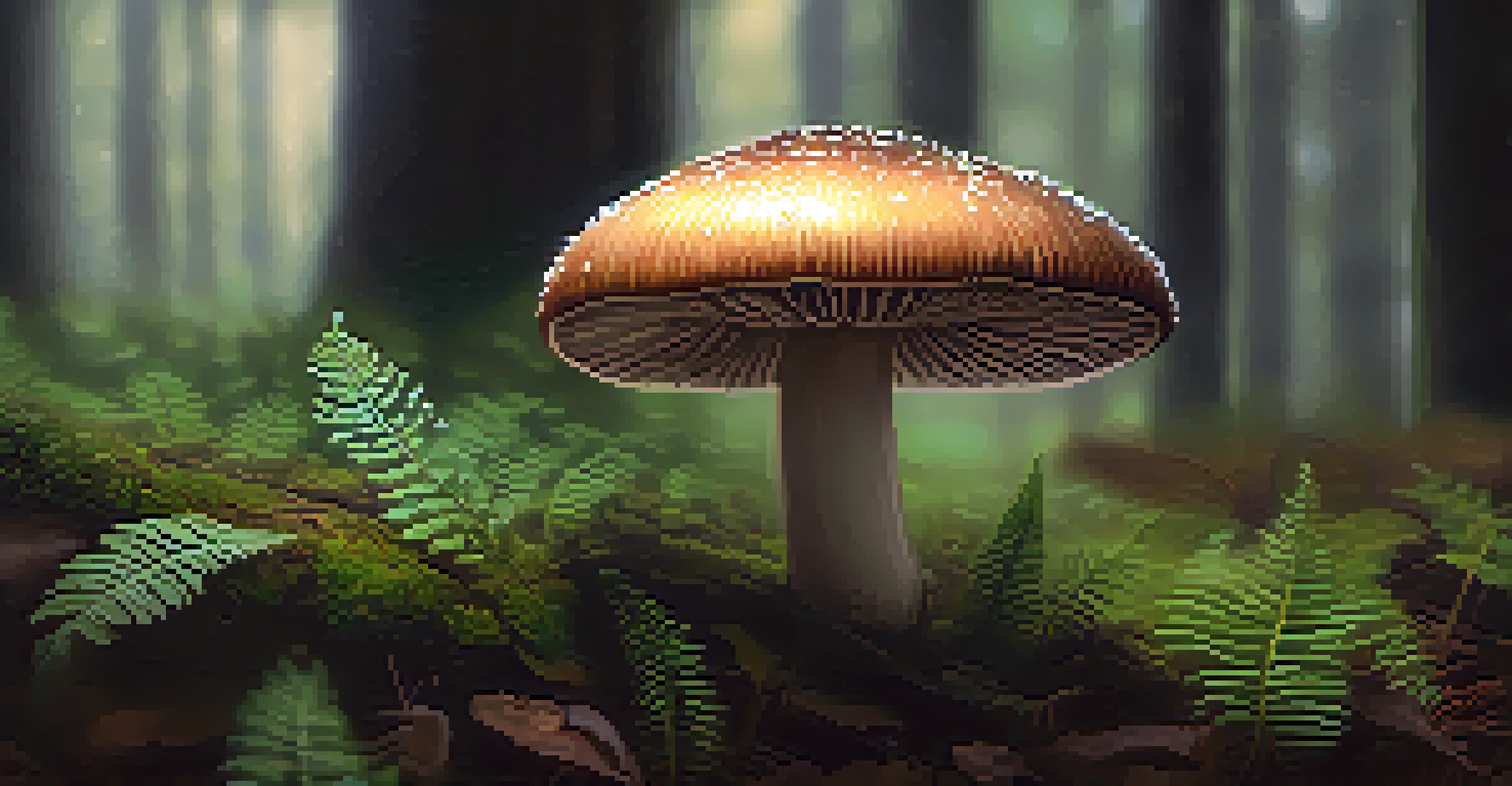Ecological Insights: Entheogenic Experiences and Awareness

Understanding Entheogens: Nature’s Psychedelic Gifts
Entheogens, derived from natural sources, have been used for centuries in spiritual practices. These substances, such as psilocybin mushrooms and ayahuasca, can induce profound altered states of consciousness. This connection to nature often leads individuals to develop a deeper understanding of their surroundings and place in the ecosystem.
Nature is not a place to visit. It is home.
When people engage with entheogens, they frequently report transformative experiences that reshape their relationship with the environment. For instance, a common thread in these experiences is the feeling of interconnectedness with all living beings. This realization can inspire a sense of responsibility towards maintaining ecological balance.
In essence, entheogens serve as a bridge to a broader ecological awareness. By fostering an appreciation for nature’s intricacies, they encourage individuals to consider the impacts of their actions on the planet. This newfound perspective can be a catalyst for positive environmental stewardship.
The Role of Spirituality in Ecological Awareness
Spirituality often plays a pivotal role in shaping our perception of the natural world. Many cultures integrate ecological stewardship into their spiritual practices, emphasizing the sacredness of nature. This spiritual lens can amplify the lessons learned from entheogenic experiences, deepening our commitment to protect the environment.

For example, indigenous communities frequently view the land as a living entity deserving of respect. Their traditions and rituals highlight the importance of sustainable practices, which can be reinforced through entheogenic experiences that promote connection to nature. This spiritual approach serves as a powerful reminder of our interdependence with the ecosystem.
Entheogens Foster Ecological Awareness
Engaging with entheogens can lead to a deeper understanding of our interconnectedness with nature and inspire a commitment to environmental stewardship.
Ultimately, merging spirituality with ecological awareness can lead to transformative change. By recognizing the spiritual significance of nature, we can cultivate a mindful approach to conservation that honors both our personal experiences and the collective well-being of the planet.
Entheogenic Experiences: Catalysts for Change
Many individuals report that their entheogenic experiences inspire significant lifestyle changes. After these profound journeys, people often feel compelled to adopt more sustainable practices, such as reduced consumption and increased recycling. The insights gained during these experiences can act as a wake-up call to our habitual routines.
The clearest way into the Universe is through a forest wilderness.
For instance, someone may emerge from an ayahuasca ceremony with a newfound appreciation for the interconnectedness of ecosystems. This realization can motivate them to advocate for local environmental causes, support sustainable businesses, or even change their dietary choices. These shifts not only benefit the individual but also contribute to broader ecological efforts.
Thus, entheogens can serve as powerful catalysts for personal and collective change. By sparking a sense of urgency and responsibility, they encourage individuals to take proactive steps towards building a healthier planet for future generations.
The Science Behind Entheogenic Effects on Perception
Research into the effects of entheogens reveals intriguing insights into human perception and consciousness. Studies have shown that these substances can alter brain connectivity, enhancing sensory experiences and emotional responses. This neurological shift often leads to feelings of unity and oneness with the environment.
For instance, a study on psilocybin found that participants experienced increased openness and emotional empathy. This heightened state of awareness can deepen one’s appreciation for nature’s beauty and complexity. Such findings support the idea that entheogenic experiences can foster an ecological mindset.
Spirituality Enhances Nature Respect
Many cultures integrate spirituality into ecological practices, reinforcing the sacredness of nature and our responsibility to protect it.
Overall, understanding the science behind these effects helps demystify the transformative potential of entheogens. By examining how they alter perception, we can better appreciate their role in cultivating ecological awareness and responsibility.
Cultural Perspectives on Entheogens and Nature
Different cultures around the world have embraced entheogens as a means of connecting with nature. Indigenous tribes often use these substances in ceremonies that honor the spirits of the land, reinforcing their deep-rooted respect for the environment. This cultural perspective highlights the importance of maintaining harmony between humans and nature.
For example, the Mazatec people of Mexico have long utilized psilocybin mushrooms in their spiritual rituals. These experiences not only foster personal insights but also emphasize community interconnectedness and ecological balance. Such practices serve as valuable lessons for contemporary society about the significance of preserving natural resources.
By exploring these cultural perspectives, we can gain a greater appreciation for the diverse ways entheogens can enhance ecological awareness. They remind us that our relationship with nature is not just individual, but also deeply communal and ancestral.
Challenges and Ethical Considerations in Entheogenic Use
While entheogenic experiences can promote ecological awareness, there are challenges and ethical considerations to address. The increasing popularity of these substances has led to concerns about over-exploitation and cultural appropriation. It’s crucial to approach entheogenic practices with respect and mindfulness to ensure their sustainable use.
For instance, the harvesting of certain plants for entheogenic use can threaten their populations and the ecosystems they inhabit. It’s essential to remain conscious of the environmental impact and to support sustainable sourcing practices. Additionally, honoring the cultural origins of these substances is vital to prevent exploitation and to respect indigenous knowledge.
Ethical Use of Entheogens is Crucial
As the popularity of entheogens rises, it is essential to approach their use with respect for cultural origins and sustainability to prevent ecological harm.
In navigating these challenges, we can foster a more responsible approach to entheogenic use. By prioritizing ethical considerations, we not only preserve these powerful experiences but also ensure they continue to inspire ecological awareness for generations to come.
Future Directions: Integrating Entheogens and Ecology
Looking ahead, there’s a growing interest in integrating entheogenic experiences into ecological education and activism. Programs that combine nature immersion with guided entheogenic journeys could offer individuals profound insights into their relationship with the environment. This innovative approach has the potential to inspire a new wave of ecological consciousness.
For example, workshops that explore the synergy between entheogenic experiences and environmental practices could empower participants to take action. By fostering a deeper connection to nature, these programs may encourage sustainable living and community engagement. The merging of these fields could spark transformative change on both personal and societal levels.

In conclusion, the future holds exciting possibilities for integrating entheogens into ecological awareness initiatives. By leveraging the transformative power of these experiences, we can cultivate a more sustainable and harmonious relationship with our planet.